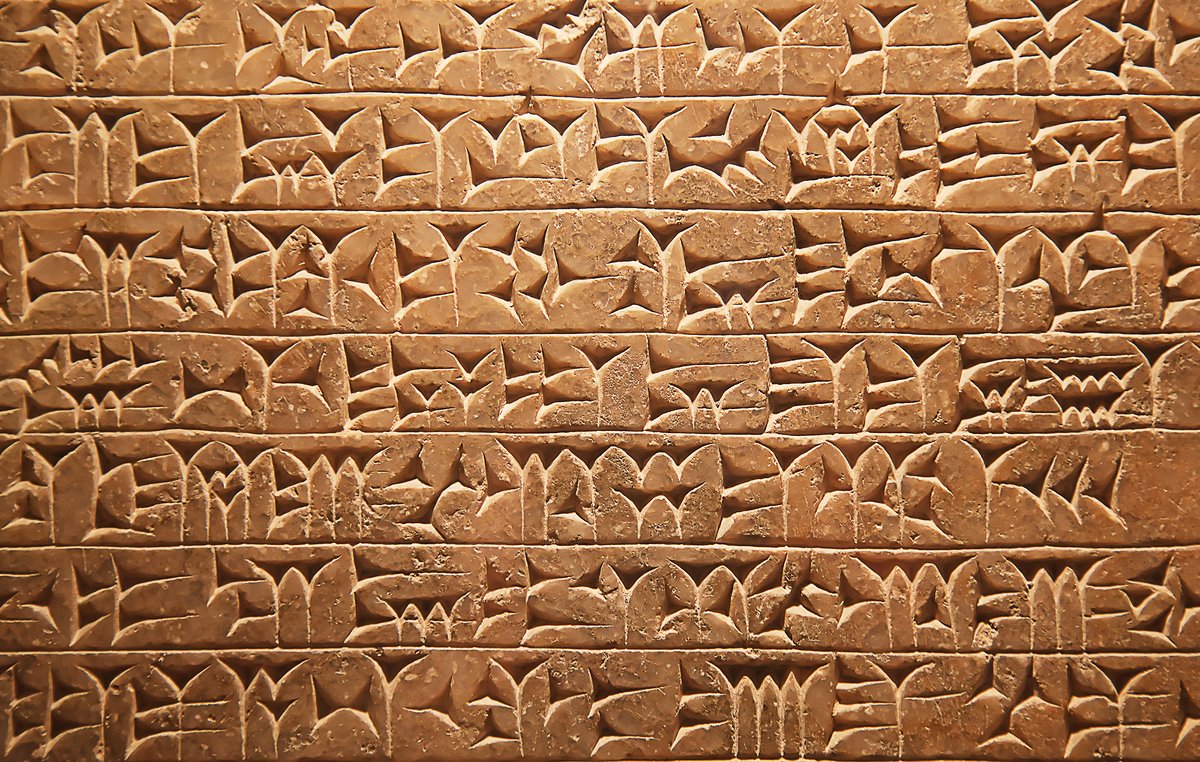Early-career AU researcher wins major grant: exploring history to make the present strange
Sophus Helle – Assyriologist, translator and cultural historian – is one of the four early-career researchers from AU who has received an internationalisation grant from the Independent Research Fund Denmark to support research abroad. Helle’s project will take him to Princeton University i New Jersey, where he’ll be studying ancient epics in order to explore how we understand and conceptualise time.

Assyriology is the study of the cultures of the ancient Near East. As the University of Copenhagen writes, the field concerns “the interpretation of the history, language, cultures and society in antiquity....based on archaeological finds and texts”.
Cuneiform is a system of writing based on wedge-shaped impressions (cunei) that were inscribed in wet clay tablets. Cuneiform is the first known system of writing; the earliest examples date from about 3500 BC.
Epics are narrative poems about the exploits of heroes and heroines.
Free rendering: How Helle describes his Danish and English versions of ancient poems and epics, rather than as faithful translations. Free rendering is highly interpretive and imaginative, not an attempt to create a transparent reproduction of the original texts in a different language.
Source: Københavns Universitet.
It would be an understatement to describe Sophus Helle’s interests as ‘niche’. He calls himself a “historical dumpster diver”: he has a passion for anything forgotten and neglected. And he’s dedicated his research to illuminating the forgotten corners of history and culture. He has already published critically acclaimed ‘free renderings’ of ancient Mesopotamian epic poems preserved in cuneiform in Danish and English, and he is currently working on a Danish retelling of the epic poem Beowulf, one of the central works of Old English literature.
Currently a postdoctoral fellow at Freie Universität Berlin, Helle will soon move on to Princeton University, thanks to a grant from the Independent Research Fund Denmark. Here he’ll explore five ancient epics: Gilgamesh, the Mahabharata, the Iliad, the Aeneid and Beowulf. He has a ready response to what must be every researcher’s favorite question:
“When people ask me why I do my projects and what we can learn from them, I usually dish up my motto: History makes the present strange. We grown up in our society and are trained to think in a particular way. What’s interesting about being a historian is that you look at other societies and other ways of thinking. They’re not necessarily better, but they are different. That’s why history can expand our intellectual, cultural and social horizons and create perspective,” he said.
“INSTUTIONS SHAPE HOW WE THINK”
According to Helle, international research is absolutely necessary in order to acquire the knowledge you need to study the literature of the ancient world. He joked that while he could theoretically have done his research from his bedroom over Zoom, it would be no substitute for the knowledge he’s looking forward to gaining from working side-by-side with his new colleagues at Princeton:
“Institutions shape how we think. The same subject taught from the same books and theories in two different classrooms at two different institutions won’t be the same experience,” he said. The same goes for research; our academic praxis is influenced by the institutions we’re part of. And by institutions, I mean both other universities and other disciplines.”
Sophus Helle has an MA in Assyriology from the University of Copenhagen and a PhD in comparative literature from Aarhus University. And that particular mix is a particularly fertile ground for international collaboration, he explained:
“I myself emigrated from a very narrow field and switched to comparative literature. The comparative aspect situates me quite naturally between disciplines. Both because comparative literature is interdisciplinary by definition, and because my own work crosses disciplinary boundaries. So I’m completely dependent on these interdisciplinary research collaborations. In this project, one thing I’ll be working on is Gilgamesh, which is my own specialty, and I’ll be comparing it with a number of other epics. And I can only do this because I’ll be at a place where there are experts in that.” He went on to describe his new grant as “enormously generous”.

About the grant
- Every year, Independent Research Fund Denmark awards international postdoc grants to some of Denmark’s most promising early-career researchers. This year, grants totally DKK 24 million were awarded to 13 different projects. Four of the 13 researchers who have received grants are from AU.
- In addition to Sophus Helle, they are: Nis Langer Primdahl, in the category Communication and Culture; Anne Katrine Ravn, in the category Nature and the Universe; and Jens Emil Sloth Grønbæk in the category “Technology and Manufacturing”.
- Read more about this year’s grants on the Independent Research Fund Denmark website.
IN DEFENCE OF FORGOTTEN GENRES
The project Helle will be working on at Princeton, entitled ”The Music of Time: Temporal Concepts in Ancient Epics”, will explore how we understand and conceptualize time –specifically, how time is conceptualized in and by ancient epics like Gilgamesh, written over four thousand years ago. Helle decided to work on the epic because he thinks the genre is underrated, he explained:
“I’m very interested in the epic, and I think it’s a truly wonderful literary form – and a very neglected form. I take pleasure in neglected things in general. Epics are denigrated as dry, long and kind of boring, both by literary historians and in popular culture, but I think the coupling of the narrative and the poetic makes it possible to explore certain themes in a very complex, interesting way.”
AN ACCELERATED TEMPORALITY
Helle’s interest in the project’s other main theme – time – is more topical: one major motive for his interest in how we conceptualize time today is the climate crisis. He said:
“I’m interesting in time because we’re currently living in a moment in history in which we see time being negotiated in ways that are exciting and new but also pretty horrifying. For example, take the climate crisis: there’s the sense that the course of time has been derailed. The temporal rhythms we’re accustomed to are no longer reliable. We’re living in in a time in which things that used to move slowly, like geology and meteorology, are suddenly moving incredibly fast. This gives us a sense that time is accelerating that makes it both difficult and strange to look just thirty years into the future.”
NOT AN ACTIVIST PROJECT
Although Helle is personally very concerned about the climate crisis, he doesn’t believe that his project will contribute to solving it:
“I’m not under the illusion that my project will make any impact on the climate crisis,” he said. “Believing that would be absurd. But this project is interesting to me personally because I experience this historical moment as uncanny. Like so many ordinary people, I think about the climate and time a lot. I suppose that I think about time more than most because I’m studying it, but I think a lot of people are preoccupied with this sense of historical acceleration.”
Helle also sees striking parallels between the heroes in the epics he’s working on and today’s climate protesters:
“Being the hero of an epic is an extremely temporal act. One thing that characterizes heroes it that they’re more invested in the future than the present. They’re willing to suffer and take a beating here and now because there’s something they want to achieve in the long term. And that’s why I think climate protesters are heroes. They’re willing to sacrifice their time, their careers and that kind of thing to create a better future.”
RESEARCH AND COMMUNICATION: TWO SIDES OF THE SAME COIN
Helle is looking forward to communicating the findings of his Princeton postdoctoral project. He views himself just as much as a communicator as a researcher. In addition to research and translation, he writes public-facing articles on research topics that interest him for Danish newspapers:
“I’m interested in finding things that interest me and opening other people’s eyes to them. Both personally and professionally. That’s what makes me happy – and some of the best experiences I’ve had as a literary historian have happened while I was explaining something to someone,” he concluded.

